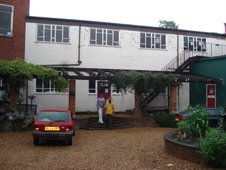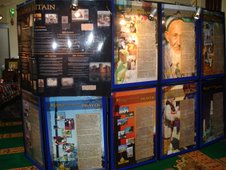A one stop summary guidance for Faith Based Charities and Places of Worship
The Commission has launched guidance on Faith in Good Governance. The guidance is for charities established with a religious purpose whose main focus is religious worship and related activities. As well as tailored guidance, it contains a number of good practice case studies.It incorporates helpful feedback the Faith and Social Cohesion Unit has received from several faith-based charities.
Copies of Faith in Good Governance can be accessed from the guidance pages on our website.
You can find more information about the Faith and Social Cohesion Unit, or about registering your organisation on the pages below.
Faith-based charities form a significant part of the charitable sector. The beneficiaries of these charities can be counted in their millions, and they make a huge contribution to communities across England and Wales.
PDF link to the 'FAITH IN GOOD GOVERNNACE' :
PDF links to Faith & Social Cohesion Unit (FSCU) Newsletters
Newsletter No.2
Newsletter No.1
PRESS RELEASE:
New governance guide for faith charities
launched to mark National Inter Faith Week
(Immediate Release - 20 November 2009)The Charity Commission, the independent regulator of charities in England and Wales, has published a new guide for all faith-based charities to help them establish strong trustee bodies and good practice. The guide is launched by the Commission’s Faith and Social Cohesion Unit (FSCU) to coincide with National Inter Faith Week (15 – 21 November 2009).
The publication, Faith in Good Governance, is aimed at the trustees, staff and volunteers of those charities established with a religious purpose whose main focus is religious worship and related activities. It brings together into one document aspects of the legal and good practice framework which are most likely to be of relevance to faith-based charities.
Faith in Good Governance has been produced as a result of ongoing work with and feedback from faith-based charities, who said that a tailored publication would be very helpful for the 30,000-plus charities on the Register that are identified as ‘faith-based’. It has been produced in an easy-to-read format and will be available in a number of languages.
Dame Suzi Leather, Chair of the Charity Commission said:
“It is important that trustees have the flexibility and freedom to decide what is the best way to achieve their charity’s aims, but at the same time they need good, useful guidance to help them in their work, which is why we have produced Faith in Good Governance. We hope trustees will find this new resource useful and that it will help faith-based charities become even more effective.”
Dr Harriet Crabtree, Director of The Inter Faith Network for the UK said:
"Faith in Good Governance will be an excellent resource for faith communities across the country. It draws on good practice examples from many different faith contexts which can help faith-based charities be even more effective in their important work."
Faith in Good Governance uses the Commission’s experience of charities operating across many different faiths and includes the perspectives of a number of people associated with particular faith-based charities. It includes practical case studies as well as summarising the legal requirements that charities ‘must’ fulfil, and the recommended good practice that charities ‘should’ adopt.
The guidance is aimed predominantly at smaller/newer charities whose main focus is operating a place of worship, but the basic principles would be equally applicable to other faith-based charities. The document will be promoted by the Commission, including through the Faith and Social Cohesion Unit, led by Ghulam Rasool.
Faith in Good Governance is available on the Commission’s website.
Ends.
Notes to Editors
1. The Charity Commission is the independent regulator of charities in England and Wales. See www.charitycommission.gov.uk for further information or call our contact centre on 0845 300 0218.
2. Our mission is: to ensure charities’ legal compliance, enhance charities’ accountability, encourage charities’ effectiveness and impact and to promote the public interest in charity.
3. In 2007, the Charity Commission set up The Faith and Social Cohesion Unit (FSCU). This is a dedicated team within the Commission which:
- works to improve the Commission’s and society’s understanding of faith-based charities;
- engages with faith communities to identify and support organisations that could be but are not currently registered with the Commission;
- assists faith-based charities to improve their standards of governance and accountability and thereby increase their effectiveness; and
- works collaboratively to achieve and promote well run and effectively regulated faith-based charities.
The team is initially working with mosques and other Muslim charities. A Project Board including representatives of the Mosques and Imams National Advisory Body (MINAB) has been established to direct and evaluate the team’s work and to provide specialist advice. For more information about the FSCU, please see the Commission’s website.
4. Faith based charities form a significant portion of the charitable sector – there are over 30,000 faith-based charities registered in England and Wales.
5. In June 2009 The Charity Commission published its ‘Big Board Talk ‘ - 15 questions all charities need to ask. Go to: http://www.charitycommission.gov.uk/tcc/ccnews29check.asp
6. The Inter Faith Network for the UK was founded in 1987 to promote good relations between people of different faiths in this country. Its member organisations include representative bodies from the Baha'i; Buddhist; Christian; Hindu; Jain; Jewish; Muslim; Sikh; and Zoroastrian communities; national and local inter faith bodies; and academic institutions and educational bodies concerned with inter faith issues. See www.interfaith.org.uk for more details.
7. National Inter Faith Week (www.interfaithweek.org) is facilitated by The Inter Faith Network for the UK and the Department for Communities and Local Government but will be community-led, with local people and groups of different backgrounds holding their own events. The week runs from 15 – 21 November 2009.
PR47/09



